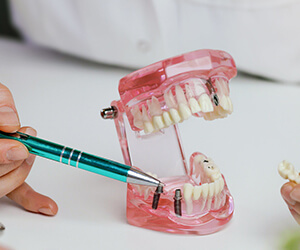Welcome To Rio Vista Dental
Every day at Rio Vista Dental, Dr. David Earnest and our team are dedicated to helping our patients find their smile again.
Whether you need to replace one tooth or several, we can help. Advancements in dental implants have allowed us to replace missing teeth with ease and help to obtain the most natural-looking results. The convenience of having an on-site lab means that we can not only improve affordability but also reduce overall treatment time. Often, we can even offer same-day care. Our skilled lab technicians have spent years perfecting their craft and are ready to help you achieve your perfect smile.
Both English and Spanish are spoken in our office so give our San Marcos dental office a call today to set up your free consultation.















